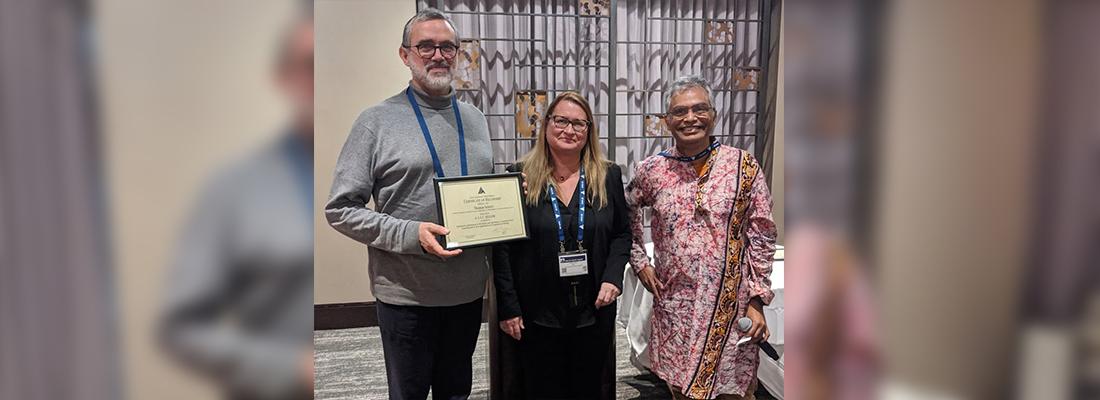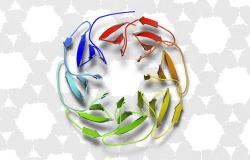Agroecology Reading time 4 min
Thomas Schiex becomes an AAAI Fellow for his outstanding research in artificial intelligence
Published on 19 February 2020

"The novel algorithms produced by our research team are able to solve increasingly complex problems in ever more effective ways in diverse fields, such as bioinformatics, automated learning, spatial and temporal resource management, and image analysis."
Thomas Schiex is a researcher director in the Research Unit for Applied Mathematics and Informatics at the INRAE centre of Occitanie-Toulouse. An artificial intelligence (AI) expert, he is interested in discovering solutions to difficult automated reasoning problems via a constraint-network-based approach. This technique uses mathematical tools to elegantly model and solve challenging puzzles.
“Artificial intelligence” is often perceived as the stuff of fiction, namely science fiction, or as completely revolutionary. Can you tell us how the field has changed over the course of your career?
Thomas Schiex: When I began my career, one of the Holy Grails was designing a computer that could beat a human at chess—a target established by AI pioneers John McCarthy and JA Robinson. At that time, people viewed AI very positively. However, a lot of promises were made with regards to AI's potential that failed to be fulfilled. We therefore hit a bit of a rough patch. Circumstances changed, though, thanks to the development of more powerful algorithms and automated learning; an increase in the number of calculation methods; and our greater access to large quantities of data. The range of AI algorithms is expanding and becoming an established part of our lives. We can see it in the proof of theorems, in games of checkers or Go, and soon, perhaps, in autonomous vehicles on our roads. More and more tasks can now be automated. This state of affairs may make employment opportunities scarcer (or free us from having to work, if our current social system evolves). The use of AI raises socio-political issues that are rarely addressed by our politicians. “The Second Machine Age” by E. Brynjolfsson and A. McAfee is a great book on this topic.
What applied uses does your research have?
Thomas Schiex: Our team is carrying out rather fundamental work that has applications in many areas. Indeed, our tool “ToulBar2” is being used by a variety of people in ways that we are completely unaware of, which may seem a bit surprising for an INRAE research team carrying out targeted research. We are dedicated to taking our work ever further and to exploiting these tools as we tackle challenges in biology and the agricultural sciences. Consequently, we have developed tools for analysing large amounts of genetic data, and we have helped decipher the genomes of plants and bacteria. We are currently interested in creating computer-aided-design technologies for smallholder fruit and vegetable farmers as part of sustainable development efforts. We are also carrying out synthetic biology research: our aim is to speed up the design of new proteins. We have had some delightful successes, and our work is becoming increasingly relevant for the health sciences and green chemistry.
It is quite enriching to leave your disciplinary bubble and interact with researchers from other fields. These exchanges are a bright echo of the era when scientists dabbled in a bit of everything. For this reason, INRAE is a great place to be if you have a strong background in the digital sciences.
The army, Facebook, Toyota, the medical field...everyone is betting on advances in AI. In your opinion, what can AI contribute to the agricultural sciences? And what are INRAE's specific relevant strengths?
Thomas Schiex: Amara's law states that "we tend to overestimate the effect of a technology in the short run and underestimate the effect in the long run". I don't believe we are headed for a future in which super powerful AI will replace humans, even in the intermediate term. In contrast, I do believe that AI, via automation, robotics, and statistics, will make it possible to automate a number of tasks in the real world (e.g., beyond the chessboard and goban), notably in the manufacturing industry, the service industry, and agriculture. Agricultural equipment will become autonomous. It will be easier to engage in precision agriculture, which will free farmers from having to perform certain tasks. It will also become more straightforward to process agricultural or biological data and to develop autopilot systems for micro-organisms.
At INRAE, the NUMM and CEPIA divisions do have researchers who work on AI, automation, and statistics. However, their numbers are small. I think we need more researchers in these fields if we want to seriously tackle the digital challenges that are accumulating across all of science. Direct collaborations with other research institutes, like INRIA, or with universities can help address this scarcity. However, a major issue is that large private companies are recruiting researchers from French universities in droves, both in the field of automated learning and, increasingly, in the field of automated reasoning. Even though this situation is a bit complicated, the work environment at INRAE is rather ideal: we are addressing practical problems, which allows us to carry out targeted research that begins with theory and ends with applied products.
|
ToulBar 2: an open-source tool for solving complex conundrumsThe goal of AI is to help computers (better) solve problems normally dealt with by humans. ToulBar2 is a specialised tool for finding solutions to puzzles involving interconnected components, such as activities that must be organised across space and time (e.g., crop management, grape harvesting, work schedules) or an image that must be broken up into specific regions. Toulbar2 can also show that it has identified the optimal solution; its abilities thus largely surpass those of more traditional tools. |
|
ToulBar2 is a sophisticated open-source tool, whose use has spread thanks to the recognition it has received during international competitions. Within the research team, Simon de Givry oversees the tool's development and makes optimal use of collaborations with French and foreign researchers—anyone can access, modify, and redistribute the code. This approach results in a positive feedback loop: it encourages the spread of ideas that, in some cases, will lead to improvements. |
The Association for the Advancement of Artificial Intelligence Fellows Programme |
|
Founded in 1979, the Association for the Advancement of Artificial Intelligence (AAAI) is a non-profit scientific society that promotes research in, and the responsible use of, artificial intelligence. Each year, AAAI honours a group of individuals who have made a significant and lasting contribution to the field of artificial intelligence. The aim of the AAAI Fellows Programme is to recognise a small percentage of the society's members, namely those who have performed outstanding research in the field. |

Link
New protein created via artificial intelligenceThe goal of artificial intelligence (AI) is to help computers (better) solve problems normally dealt with by humans. In Toulouse, bioinformatics researchers have used AI and automated reasoning algorithms to design a hyperstable self-assembling protein. This work is the fruit of a collaboration between INRAE scientists in the Research Unit for Applied Mathematics and Informatics (at the centre of Occitanie-Toulouse) and scientists in Belgium and Japan.
